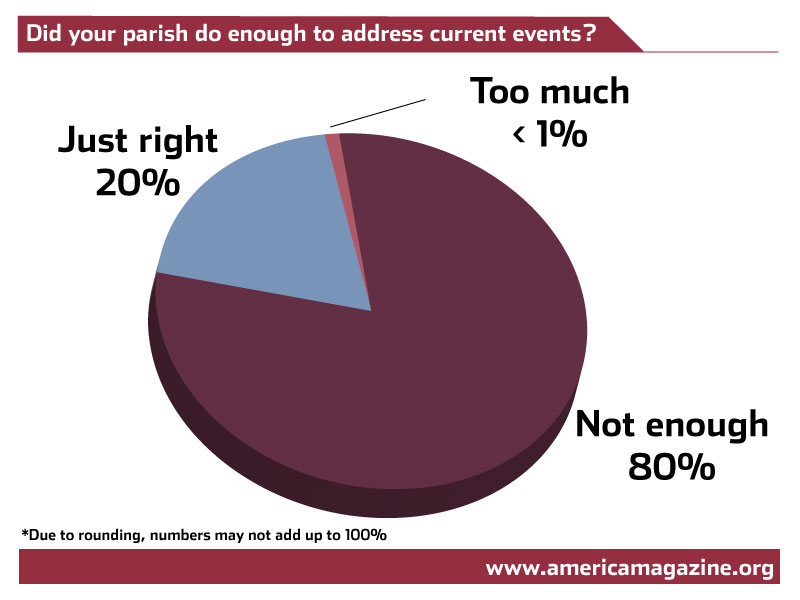An opportunity lost: What Catholics actually wanted to hear at Mass last weekend
Last week was a momentous week in U.S.
politics. President Trump signed several executive orders pertaining to
immigration and refugees, and tens of thousands of people around the
country gathered to protest these measures. Plus, on Friday, the annual
March for Life took place in Washington, D.C., with a sitting vice
president addressing the crowd for the first time.
We asked America readers if these current events were discussed during Mass on Sunday Jan. 29.

The overwhelming response to the survey was
that these political issues were not discussed at all by homilists and
congregants were left wanting. Eighty percent of poll respondents agreed
that not enough was done in their parishes to address the ongoing
political upheaval. Meanwhile only 1 percent wrote that current events
were given too much consideration during Mass.
Of the dissatisfied majority, many respondents
mentioned that their parish priests were capable of thoughtful
homilies, but wished that these homilies spoke more directly to their
practical lives. Joshua L. from Kirkland, Wash., expressed
disappointment that immigration and the refugee crisis were not
discussed. “Don't get me wrong, our parish priest is an excellent
homilist, but I was frustrated that the opportunity to affirm our faith
in the face of injustice was lost.” Elizabeth Reed from Costa Mesa, Ca.,
reiterated this point in the context of her own parish’s demographics:
“We have a somewhat divided parish as the church family is composed of a
very large immigrant population and the parish school is predominantly
Caucasian and upper middle class…. I think yesterday was a missed
opportunity for connection.”
Also from California, Mayra Torres is a
Catholic undocumented immigrant who experienced the devastating impact
of this missed opportunity first hand. She wrote to us about how the
silence of her parish is contributing to divisions in her community. “I
feel alienated from my church, and I feel threatened by the present
administration…. As a catequista I am questioning whether I should be serving and teaching my faith. I feel abandoned, not by God but by church leaders.”
This sense of abandonment was not felt in all
parishes. At 20 percent, a low but not inconsiderable number of readers
felt their parish adequately addressed current events during Mass. An
anonymous reader from Washington, D.C., described a Mass that spoke
directly to pro-life commitments and to the executive orders on
immigration and refugees: “Our parish prayed in a special way for a
refugee family that we are sponsoring… Our prayers of the faithful
included a prayer that we uphold the dignity of all human life,
including the elderly, the unborn, refugees, and immigrants. I am proud
to be part of a parish that demonstrates its commitment to minister to
those at the margins.”
Talking about politics is always a fraught
matter, perhaps especially from the pulpit. Many homilists are, as they
should be, wary of expressing partisan opinions and dividing communities
with too much political talk. But this much is clear: silence is not
conducive to solidarity, either.


No comments:
Post a Comment